Israel’s military has issued some more pictures of its troops operating inside the Gaza Strip during the temporary truce period.

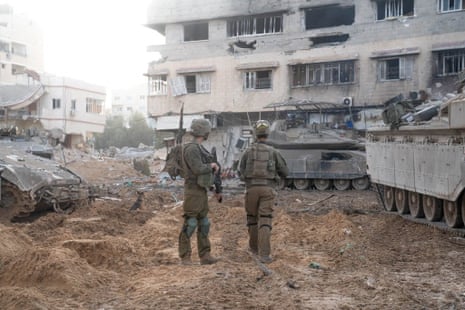



Iran’s president Ebrahim Raisi is making his first official visit to Turkey today, AFP reports. He will meet his Turkish counterpart Recep Tayyip Erdoğan, one of Israel’s most outspoken critics since 7 October.
Erdoğan has described Israel as a “terrorist state” and called Iran-backed Hamas “a liberation group”, much to the annoyance of Tel Aviv. He has also suggested trying Israeli politicians and military commanders in the international criminal court in The Hague.
Tareq Abu Azzoum has been reporting from Khan Younis in Gaza for Al Jazeera. He writes that with the extended pause in fighting “the main concern for people is trying to gain access to as many supplies – including food and water – and to get in contact with their relatives in the north, in case fighting resumes.”
An Israeli hostage freed by Hamas has said in an interview that she was initially fed well in captivity until conditions worsened and people became hungry, the Associated Press reports. She was kept in a “suffocating” room and slept on plastic chairs with a sheet for nearly 50 days. The news agency writes:
In one of the first interviews with a freed hostage, 78-year-old Ruti Munder told Israel’s Channel 13 television that she spent the entirety of her time with her daughter, Keren, and grandson, Ohad Munder-Zichri, who celebrated his ninth birthday in captivity. Her account, broadcast Monday, adds to the trickle of information about the experience of captives held in Gaza.
Munder was snatched 7 October from her home in Nir Oz, a kibbutz in southern Israel. Her husband, Avraham, also 78, was taken hostage too and remains in Gaza. Her son was killed in the attack.
Initially, they ate “chicken with rice, all sorts of canned food and cheese,” Munder told Channel 13. “We were OK.”
They were given tea in the morning and evening, and the children were given sweets. But the menu changed when “the economic situation was not good, and people were hungry.”
Israel has maintained a tight siege on Gaza since the war erupted, leading to shortages of food, fuel and other basic items.
Munder, who was freed Friday, returned in good physical condition, like most other captives.
Freed hostages have mostly kept out of the public eye since their return. Any details about their ordeal have come through relatives, who have not revealed much.
Munder, confirming accounts from relatives of other freed captives, said they slept on plastic chairs. She said she covered herself with a sheet but that not all captives had one.
Boys who were there would stay up late chatting, while some of the girls would cry, she said. Some boys slept on the floor.
She said she would wake up late to help pass the time. The room where she was held was “suffocating,” and the captives were prevented from opening the blinds, but she managed to crack open a window.
“It was very difficult,” she said.
Munder said that on 7 October, she was put on a vehicle with her family and driven into Gaza. A militant draped over them a blanket her grandson had carried from home, which she said was meant to prevent them from seeing the militants around them. While in captivity, she learned from a Hamas militant who listened to the radio that her son was killed, according to the Channel 13 report.
Still, she said, she held out that hope she would be freed.
“I was optimistic. I understood that if we came here, then we would be released. I understood that if we were alive – they killed whoever they wanted to in Nir Oz.”




Ahed Tamimi, who rose to global prominence after a video of her slapping an Israeli soldier went viral in 2017, is on a list of 50 Palestinian prisoners released by Israel’s justice department who could be freed in exchange for Israeli hostages.
Tamimi spent eight months in prison for the 2017 assault.
The now 22-year-old was arrested again on 6 November when the Israeli military raided her home in the occupied West Bank, accusing her of inciting violence and calling for terrorist activity in an Instagram post.
Her family has denied that she wrote the post, saying she is frequently hacked online.
The New York Times reported on Monday that Israel had moved to incarcerate her under administrative detention.
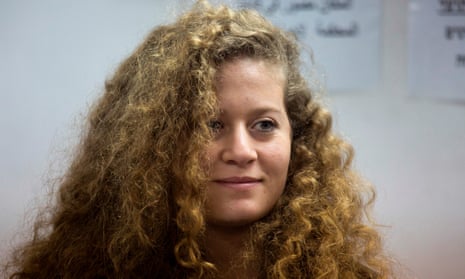



Citing her lawyer, Mahmoud Hassan, the Times reported that she faced indefinite imprisonment, without charges or trial, based on evidence that neither she nor her lawyer are allowed to see.
“I’m hopeless to defend her,” Hassan said.
Another batch of 10 Israeli hostages are expected to be released by Hamas today, in line with the extension of the ceasefire. The Guardian has been keeping track of those released so far here:
A London surgeon has described witnessing a “massacre unfold” during 43 days spent under bombardment in Gaza, saying the destruction of the Palestinian health system was a military objective of the war.
Speaking at a press conference in London, Prof Ghassan Abu-Sittah, a plastic and reconstructive surgeon, who will later give evidence to Scotland Yard, told of horrific scenes at al-Ahli Arab and Dar al-Shifa hospitals as they ceased to function and said he witnessed the use of white phosphorus munitions.
The Israel Defense Forces (IDF) have denied using such weapons.
“Having seen this massacre unfold, the creation of an uninhabitable Gaza Strip was the aim and the destruction of all the components of modern life at which the health system lies was the main military objective,” said Abu-Sittah, who has a practice in west London and has worked in Gaza since 2009, as well as in wars across Yemen, Iraq, Syria and Lebanon.
When asked about Israel’s claims of being at war with Hamas and its denial of targeting civilians in Gaza, he said: “Statistically, it appears that the numbers tell a different story.”
Some more images from the West Bank, where families have been celebrating the release of their loved ones – 30 children and three women – from Israeli prisons.
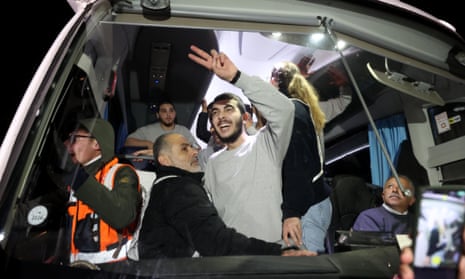







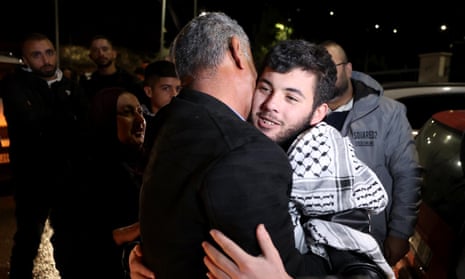



The US secretary of state, Antony Blinken, will visit Israel, the West Bank and the United Arab Emirates this week, a senior state department official has said on Monday, to press for more humanitarian aid for Gaza and help secure the release of all hostages kidnapped by Hamas.
It will be the third visit to the region by the US’s top diplomat since the war broke out on 7 October and comes as the US pressures Israel to extend the ceasefire further. Reuters reports:
The secretary will stress the need to sustain the increased flow of humanitarian assistance to Gaza, secure the release of all hostages and improve protections for civilians in Gaza,” said a senior State Department official, speaking on the condition of anonymity.
Blinken will discuss what Washington wants to see in Gaza if Israel is able to eliminate Hamas and the need for an independent Palestinian state as well as attend the UN Cop28 climate summit in Dubai, the official added.
Blinken will continue to the Middle East after visits to Belgium and North Macedonia.
Since the shocking attack that started one of the bloodiest chapters in the decades-long Israeli-Palestinian conflict, Blinken has conducted high-stakes diplomacy with Israeli and Arab leaders to help ensure the conflict does not broaden, hostages are freed and aid is delivered into the Gaza Strip, where a humanitarian disaster has been unfolding.
This week, he will speak about the future of Gaza and the need for a permanent political solution to the long-standing conflict, after he spelled out Washington’s red lines on a visit to Japan earlier this month for how the strip could be governed if Hamas is defeated.
Blinken ruled out Israeli occupation of Gaza, permanent displacement of its people and reduction in its territory, although a clear plan has yet to emerge in talks with Arab states, Israel and Palestinian leaders.
The US diplomat “will discuss with partners in the region the principles he laid out in Tokyo for the future of Gaza and the need to establish an independent Palestinian state,” the official said.
Blinken landed on Monday evening in Brussels, where he will attend the Nato foreign ministers summit on Tuesday. He will be attending a meeting of the Organization for Security and Cooperation in Europe that is scheduled to take place on Wednesday in Skopje.
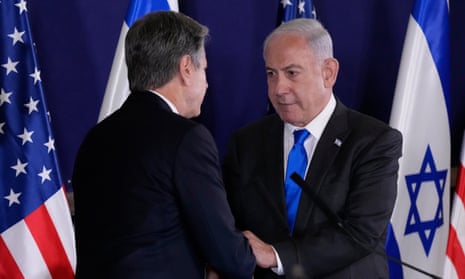



One of the Palestinian children released from an Israeli prison has told Al Jazeera he was beaten by Israeli guards last week and his hand and finger were broken.
Mohammed Nazzal, a teenager originally from Jenin, said he was given no treatment in the prison in the Negev desert despite his injuries and had only had his arm put in a sling after he was released, by the Red Cross.
“They gave me nothing,” he said, referring to the Israelis. “I broke my hand, I can’t move my finger.” It was not possible to verify his account.
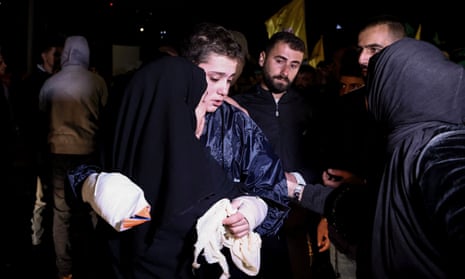



His mother, who stood next to him as he was interviewed, said she had had no idea of what was happening to him. “There were no calls, no visits, nothing,” she said.
According to UN data, one in five Palestinians spends time in Israeli prison at some point. Before the exchange of hostages and prisoners began last week, the Palestinian Prisoners Society said 7,200 prisoners were held by Israel, among them 88 women and 250 children.
Many on the list of 300 are held in administrative detention, which allows for pre-emptive arrest, on secret evidence, and six-month extendable stints in prison without charge or trial.
Israel has arrested an additional 3,260 Palestinians, including 120 women and more than 200 children, since 7 October.
Two Palestinians have been killed by Israeli forces in the West Bank, the Israeli newspaper Haaretz has reported.
One person was killed near the West Bank town of Beitunia, the paper wrote citing the Palestinian health ministry while another was killed in the nearby city of Ramallah it said, citing medical sources.
More than 200 Palestinians have been killed by Israeli forces in the West Bank since 7 October.
Violence had also flared as Israeli forces clashed with Palestinians gathered outside Ofer prison, between Beitunia and Ramallah, to greet the prisoners released.
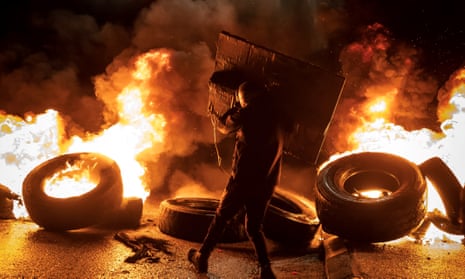



Separately Al Jazeera reported that two men were also taken to a hospital after both were shot in their legs by Israeli forces during the latest raid on the Deir Ammar refugee camp west of Ramallah.
Citing the Palestinian news agency Wafa, it said there were confrontations between Israeli forces and young Palestinians in the refugee camp, prompting the Israeli soldiers to fire live bullets.
During the raid, Israeli forces also surrounded the house of a Palestinian man killed in August and started excavation work around the building in preparation for a possible demolition, according to Wafa.
Thirty-three Palestinians – 30 children and three women – have been released from Israeli jails following the freeing of 11 Israeli hostages from Gaza.
The Israel Prison Service said the prisoners were released from Israel’s Ofer prison in the West Bank and from a detention centre in Jerusalem, bringing the total number of Palestinians it has freed since Friday to 150.
Footage posted on Twitter showed crowds of Palestinians greeting the former prisoners as they arrived in the West Bank.
In East Jerusalem, 17-year-old Muhammad Abu al-Humus called his release “an indescribable joy” and kissed his mother’s hand as he entered his home.
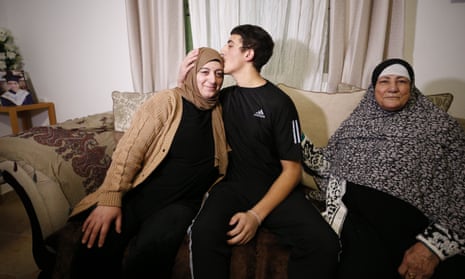



Other footage showed former child prisoners joyfully reuniting with their families.
The White House and Qatari negotiators have said the original four-day pause in fighting in Gaza, due to expire at 7am local time on Tuesday (0500 GMT), has been extended for two more days.
The US national security council spokesman John Kirby said that “in order to extend the pause, Hamas has committed to releasing another 20 women and children”.
“We have an extension … two more days,” Qatar’s UN ambassador Alya Ahmed Saif Al-Thani told reporters after a closed-door UN security council meeting, saying both sides were to release more people. “This is a very positive step.”
Israel has not commented on any agreement to extend the truce but, in what may be an implicit confirmation, the Israeli prime minister’s office said the government had approved the addition of 50 female prisoners to its list of Palestinians for potential release if additional Israeli hostages are freed.
Israel had previously said it would extend the truce by one day for every 10 more hostages released.
While describing the extension as “a glimpse of hope and humanity,” the UN secretary general, António Guterres, said two more days was not enough time to meet Gaza’s aid needs.
“I strongly hope that this will enable us to increase even more the humanitarian aid to the people in Gaza that [are] suffering so much – knowing that even with that additional amount of time, it will be impossible to satisfy all the dramatic needs of the population,” Guterres told reporters.
Eleven Israeli hostages, nine children and two women, were freed by Hamas late Monday and taken to a hospital in Tel Aviv to reunite with their relatives.
The fourth batch of hostages was made up of dual nationals of France, Germany and Argentina, according to Qatar.
The Israel Defense Forces named the 11 released on Monday as Eitan Yahalomi, Sharon Kunio, three-year-old twins Emma and Yuly Kunio, Karina Engel, Mika Engel, Yuval Engel, Sahar Kalderon, Erez Kalderon, Or Yaakov and Yagil Yaakov.
According to Haaretz, Diego Engel-Bert, the brother of Karina Engel-Bert and uncle of Mika Engel, 17, and Yuval Engel, 11 told Channel 12 News:
We are all here glued to the screen and full of happiness and longing. It’s good to have a chest to stop the heart from escaping. We’re starting to see a little light in the darkness we are in, waiting for them to come so we can hug. Just hug, no need to talk, everything else will come later.
In total, Hamas has released 69 of the about 240 hostages it seized on 7 October.




Hello and welcome to the Guardian’s live coverage of the Israel-Hamas war.
Thirty-three Palestinian prisoners, 30 children and three women, have been released from Israeli jails after Hamas released 11 Israelis – nine children and two women – kidnapped on 7 October.
The fourth exchange of hostages and prisoners came as officials from Qatar and the US confirmed that the four-day ceasefire had been extended by another two days.
The US national security council spokesperson John Kirby said that “in order to extend the pause, Hamas has committed to releasing another 20 women and children”.
Israel has not commented on any agreement to extend the truce but, in what may be an implicit confirmation, the Israeli prime minister’s office said Israel’s government approved the addition of 50 female prisoners to its list of Palestinians for potential release if additional Israeli hostages are freed.
Here are the key developments:
-
A deal to extend the current ceasefire between Israel and Hamas by two days has been agreed. Hamas said it had agreed to the extension of the four-day truce by 48 hours after the intervention of Qatar and Egypt, the principal mediators for the initial agreement, and with the same conditions. The extension came after a frantic dash by mediators with just over 12 hours remaining before hostilities in Gaza were due to resume.
-
Israel has confirmed the release of 11 hostages from Hamas captivity in the Gaza Strip on Monday. Among those released include three-year-old twins, and all were kidnapped from their homes in the same kibbutz. It brings the number of Israelis freed under the truce to 50 – out of roughly 240 hostages captured on 7 October – along with 19 hostages of other nationalities. Israel has said it would extend the ceasefire by one day for every 10 additional hostages released.
-
Thirty-three Palestinians detained in Israeli prisons, 30 children and three women, were released late Monday. The release was marred by clashes between the Israeli military and Palestinians awaiting the prisoners outside Ofer prison, with one Palestinian killed by Israeli forces, according to the Palestinian health ministry.
-
There are widespread fears that any break in the conflict that has devastated swaths of Gaza and killed many thousands of civilians will only be brief. Yoav Gallant, Israel’s defence minister, told troops on Monday that when fighting recommenced its “strength will be greater, and it will take place throughout the entire strip”. “You now have a few days, we will return to fighting, we will use the same amount of power and more,” Gallant said.
-
Aid agencies have welcomed the two-day extension of the truce in Gaza but voiced concern that the expected resumption of Israel’s attack on Hamas would lead to an even deeper humanitarian crisis among Palestinians. A particular concern was the impact on people in the crowded south of the strip, where about 2 million people are now living around Khan Younis and elsewhere. Many fled south after Israel demanded they evacuate the northern area around Gaza City last month.
-
More than 14,800 Palestinians have been killed in Gaza since 7 October, including 6,150 children and 4,000 women, the Palestinian ambassador to the UN has said. Thousands more remain under the rubble, he wrote in a letter to the UN security council on Monday.
-
The EU’s top diplomat has said that “Palestinian people cannot pay for the action of Hamas” as he urged for the truce in Gaza to be extended to a permanent one. Josep Borrell, at a press conference on Monday, said “it makes no sense to give food to somebody that will be killed the day after. We need to stop the bombardment.”
-
A London surgeon has described witnessing a “massacre unfold” during 43 days spent under bombardment in Gaza, saying the destruction of the Palestinian health system was a military objective of the war. Prof Ghassan Abu-Sittah, a plastic and reconstructive surgeon, told of horrific scenes at al-Ahli Arab and Dar al-Shifa hospitals as they ceased to function and said he witnessed the use of white phosphorus munitions.
-
The Committee to Protect Journalists (CPJ) says 57 journalists have been killed since the start of the Israel-Hamas war. The conflict was already the deadliest on record for journalists.
-
A suspect was arrested on Sunday in the shooting of three Palestinian students in Burlington, Vermont, the night before, police said. Hisham Awartani, Kinnan Abdalhamid and Tahseen Ali Ahmed were on their way to Awartani’s grandmother’s house for Thanksgiving dinner when they were fired on. Jason J Eaton, 48, pleaded not guilty at an arraignment hearing on Monday. Joe Biden expressed horror at the shooting and reiterated that “there is no place for violence or hate in America”.
-
The far-right leader Stephen Yaxley-Lennon has been charged after attending a march against antisemitism in London on Sunday. The Metropolitan police said Yaxley-Lennon, who uses the name Tommy Robinson, has been charged with failing to comply with an order excluding him from the area of the march.
This post was originally published on this site be sure to check out more of their content.








